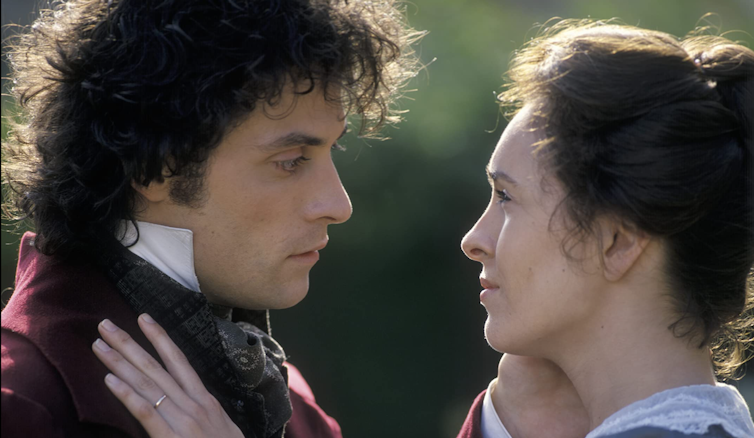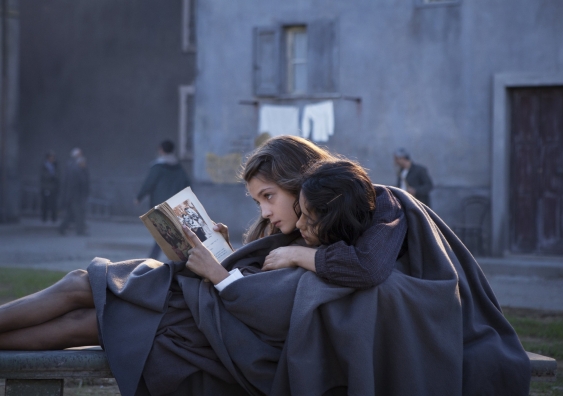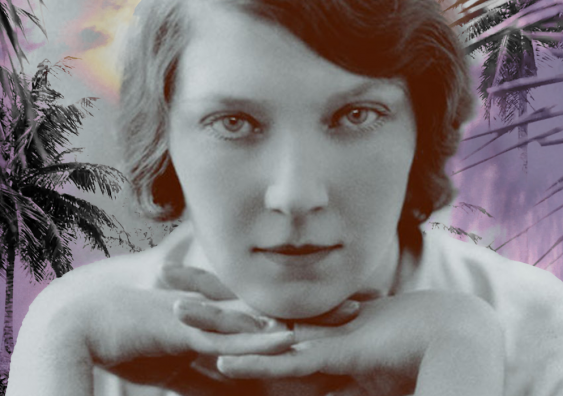George EliotŌĆÖs Middlemarch: egoism, moral stupidity, and the complex web of life
2023-06-06T13:58:00+10:00

IMDB

In George EliotŌĆÖs masterpiece of 19th century realism, characters are confronted with the limits of their individual capacities and visions.
George EliotŌĆÖs Middlemarch: egoism, moral stupidity, and the complex web of┬Ālife

In our Guide to the Classics series, experts explain key works of literature.
Middlemarch (1872) is a slow read and a deeply immersive one.
George Eliot ŌĆō the pen name of (1819-1880) ŌĆō built rich and complex fictional worlds that she hoped would allow readers to be ŌĆ£better able to imagine and to feel the pains and joys of those who differ from themselves in everything but the broad fact of being struggling, erring human creaturesŌĆØ.
This avowedly humanist world-building would come to be called realism. Middlemarch is often cited as a template of that now familiar mode.
The novelŌĆÖs subtitle ŌĆō ŌĆ£A Study of Provincial LifeŌĆØ ŌĆō suggests a serious project guided by ethical and scientific principles. This aim was a far remove from the conventional marriage plots and melodramatic style of ŌĆ£silly lady novelistsŌĆØ, as Eliot snarkily called them. She offered her readers multiple perspectives and ways to study the lives of others.
These are elucidated in rhetorically astonishing passages and justly famous metaphors. One of the better known is the pier glass, which the narrator details in one of the novelŌĆÖs many transitions from third- to first-person:
An eminent philosopher among my friends, who can dignify your ugly furniture by lifting it into the serene light of science, has shown me this pregnant little fact. Your pier-glass or extensive surface of polished steel made to be rubbed by a housemaid, will be minutely and multitudinously scratched in all directions; but place now against it a lighted candle as a centre of illumination, and lo! The scratches will seem to arrange themselves in a fine series of concentric circles round that little sun. It is demonstrable that the scratches are going everywhere impartially, and it is only your candle which produces the flattering illusion of a concentric arrangement, its light falling with an exclusive optical selection. These things are a parable. The scratches are events, and the candle is the egoism of any person now absent ŌĆ”
Eliot visualises the illusory coherence generated by egoism. Readers might apply this understanding to their own selective vision, as well as to the characters that fill the pages of Middlemarch.
Moving fluently from one intricate psychological characterisation to another, Eliot illuminates her charactersŌĆÖ minds, while subtly reminding us of the mediated nature of that access. As readers, we are never entirely sure what her characters see and what the narrator sees on their behalf. In the process, we are invited to think about the complex nature of character, memory, love, friendship, work, greed, hypocrisy, discovery, community and so much more.
The fabric of life
Middlemarch is specific and local rather than universal in scope. It is set in a small English village called Middlemarch in the 1830s, a period of heated political debate and unrest. The noisy unevenness of progress is ever-present. Machine breaking (anti-industrialism), vociferous crowds and the shifting moods of popular opinion unsettle the lives of MiddlemarchŌĆÖs citizens.
Allusions to historical events ŌĆō such as the passage of the 1832 Reform Bill (which enfranchised many previously disenfranchised voters) and major developments in medical science ŌĆō contribute to the novelŌĆÖs complex organisation, in which affinity and community are deeply felt and sometimes oppressive.
This organisation is more akin to the interwoven threads of a piece of intricately patterned fabric or the neural networks of the human body than a spiderŌĆÖs web. In another aside, EliotŌĆÖs narrator explicitly differentiates the web-like structure of Middlemarch from the freewheeling and expansive storytelling of 18th-century precursors, such as Henry FieldingŌĆÖs picaresque novel Tom Jones:
We belated historians must not linger after [FieldingŌĆÖs] example: and if we did so, it is probable that our chat would be thin and eager, as if delivered from a camp-stool in a parrot-house. I at least have so much to do in unravelling certain human lots, and seeing how they were woven and interwoven, that all the light I can command must be concentrated on this particular web, and not dispersed over that tempting range of relevancies called the universe.
EliotŌĆÖs process of ŌĆ£unravellingŌĆØ her characters invites the reader to examine and compare, as if through a microscope, their resemblances and divergences. Her characters may not know one another, but the threads of their lives are woven together by her deft use of analogy and metaphor. Transitions from one part of the web to another are often framed as seemingly casual reminders that the lives of other characters have been going on while our focus has been elsewhere.
Inconvenient indefiniteness
Henry James complained that ŌĆ£Middlemarch is too often an echo of Messrs. Darwin and HuxleyŌĆØ.
It may be hard for us to hear these echoes, but it would have been impossible for 19th century readers not to do so. Eliot had read DarwinŌĆÖs The Origin of the Species when it first appeared in late 1859. By the 1870s, as has influentially argued, DarwinŌĆÖs theories informed both the structure and the themes of her novels, but Eliot disagreed with DarwinŌĆÖs ŌĆ£idea of the single progenitorŌĆØ.
To quote Beer: ŌĆ£This emphasis on plurality, rather than upon singleness, is crucial to the developing argument of Middlemarch.ŌĆØ
EliotŌĆÖs language is thus intentionally resonant and allusive, but rather than echoing the ŌĆ£maximsŌĆØ of others, Middlemarch models ways of reading between different knowledge and belief systems. The fictional design of Middlemarch reveals the absence of one absolute authority or single interpretation of the origin or meaning of life. Characters who misguidedly pursue such an aim ŌĆō such as the scholar Casaubon, with his ŌĆ£Key to All MythologiesŌĆØ ŌĆō inevitably find themselves diverted and confronted by the limits of their individual capacities and vision.
The emphasis on variety, relation and entanglement begins with the novelŌĆÖs prelude, in which EliotŌĆÖs narrator reflects on the ŌĆ£inconvenient indefinitenessŌĆØ of a womanŌĆÖs lot as something that frustrates ŌĆ£scientific certitudeŌĆØ.
Dorothea Brooke, the novelŌĆÖs heroine, exemplifies this indeterminacy and variety. She is ardent, ambitious and intelligent. She is also a terrible judge of potential husbands, a failing that is sympathetically detailed by EliotŌĆÖs omniscient narrator. Dorothea yearns for social purpose and a genius to serve. This leads her to become ensnared in a marriage to Casaubon, who reveals himself to be a controlling jealous pedant.
It is a cruel outcome, vividly animated by EliotŌĆÖs extraordinary prose. In chapter 20, to take one of many possible examples, we find Dorothea in Rome on her honeymoon. Agonised by the early signs that married life is not what she imagined, she finds the vast wreckage and epic ambition of Rome overwhelming. At this critical moment, Eliot undercuts the potential melodrama of her heroineŌĆÖs ŌĆ£stifling depressionŌĆØ, insisting on the unexceptional nature of her plight in a startling aside. She begins by reflecting on the conventional nature of her heroineŌĆÖs marital disappointments:
Some discouragement, some faintness of heart at the new real future which replaces the imaginary, is not unusual, and we do not expect people to be deeply moved by what is not unusual.
The subsequent sentences push further into this unbearable truth:
That element of tragedy which lies in the very fact of frequency, has not yet wrought itself into the coarse emotion of mankind; and perhaps our frames could hardly bear much of it. If we had a keen vision and feeling of all ordinary human life, it would be like hearing the grass grow and the squirrelŌĆÖs heart beat, and we should die of that roar which lies on the other side of silence. As it is, the quickest of us walk about well wadded with stupidity.
To be stupid, Eliot insists, is a common experience. Even the ŌĆ£quickest of usŌĆØ are necessarily guilty of stupidity in our efforts to filter the confusing cacophony of ŌĆ£ordinary human lifeŌĆØ.
In this sense, stupidity is not a permanent character trait, but a contingent avoidance of the incomprehensible scale of human existence. Shocked out of the youthful self-absorption that had allowed her to imagine her new husband as a wise and original intellect, Dorothea emerges from her ŌĆ£stupidityŌĆØ to confront the disappointing reality that her husband possesses an ŌĆ£equivalent centre of selfŌĆØ and an equal proportion of ŌĆ£moral stupidityŌĆØ.
Unlit transparency
When Dorothea returns from Rome to Middlemarch, nothing looks or sounds the same:
The ideas and hopes which were living in her mind when she first saw this room nearly three months before were present now only as memories: she judged them as we judge transient and departed things. All existence seemed to beat with a lower pulse than her own, and her religious faith was a solitary cry, the struggle out of a nightmare in which every object was withering and shrinking away from her. Each remembered thing in the room was disenchanted, was deadened as an unlit transparency ŌĆ”
Recalling both the pier glass and ŌĆ£the roar on the other side of silenceŌĆØ, the arresting metaphor of a microscopeŌĆÖs ŌĆ£unlit transparencyŌĆØ registers a profound shift in DorotheaŌĆÖs point of view. It also serves a structural purpose, prompting the reader to recall another character synonymous with microscopes and disastrous marital choices, Dr Tertius Lydgate.
Dorothea and Lydgate are unknown to one another at this stage of the plot, but Eliot has already begun to weave the threads of their lives together through the connective force of metaphor and analogy.
When Eliot began writing Middlemarch, she was planning to write two novels about two distinct webs of characters. One centred on Dorothea Brooke and the other on Tertius Lydgate.
Lydgate is a young ambitious doctor recently arrived in Middlemarch, having completed his medical studies in London, Edinburgh and Paris. Keen to reform the backward practices of MiddlemarchŌĆÖs medical profession by introducing the latest discoveries in the treatment of fever and other ailments, LydgateŌĆÖs arrogance and lack of sympathy lead to debt, accusations of criminality and thwarted ambition. He offends his peers, attracts the patronage of the hypocritical banker Nicholas Bulstrode, and marries the beautiful but superficial Rosamond Vincy, to name just a few of his many blunders.
EliotŌĆÖs sympathetic characterisation of LydgateŌĆÖs uneven mix of stupidity and brilliance mirrors the complex web of affinities and connections with which she surrounds Dorothea. In multiple remarkable passages, Eliot draws on recent discoveries in human pathology to illuminate LydgateŌĆÖs character ŌĆ£as a process and an unfoldingŌĆØ:
he longed to demonstrate the more intimate relations of living structure and help to define menŌĆÖs thoughts more accurately after the true order. The work had not yet been done, but only prepared for those who knew how to use the preparation. What was the primitive tissue? In that way Lydgate put the question ŌĆō not quite the way required by the waiting answer; but such missing of the right word befalls many seekers. And he counted on quiet intervals to be watchfully seized, for taking up the threads of investigation ŌĆō on many hints to be won from diligent application, not only of the scalpel, but of the microscope, which research had begun to use again with new enthusiasm of reliance. Such was LydgateŌĆÖs plan for the future: to do good small work for Middlemarch, and great work for the world.
In a novel designed around multiple related yet distinct systems, rather than singular origins, Lydgate asks the wrong kind of question. The diligent study of ŌĆ£the primary webs or tissuesŌĆØ of the human body, like DarwinŌĆÖs elaboration of the complex system of ŌĆ£all living and extinct formsŌĆØ, moves at a very different pace to the brisk commerce and materialism that drives the ordinary folk of Middlemarch, whom he hopes to enlighten and save.
Here, the metaphor of the web takes on grimmer connotations, stifling ambition and coercing conformity. Lydgate is undone by his own failure to apply his ŌĆ£seekingŌĆØ intellect to his interactions with his colleagues or his choice of a wife. EliotŌĆÖs darkly humorous description of his bitter struggles with Rosamond over money, social mobility and furniture invites readers to reflect on the charactersŌĆÖ mutual stupidity, while urging compassion and sympathy.
Microscopic portrayal
EliotŌĆÖs microscopic portrayal of the various ecosystems that surround Lydgate and Dorothea exemplifies another striking feature of the 19th-century realist novel: the tension between an intensive focus on the inner-life of a few privileged individuals and a democratising emphasis on the equal value of all characters. As puts it:
The realist novel is infused with the sense that any character is a potential hero, but simultaneously enchanted with the individual, defined through his or her interior consciousness.
The cast of potential main characters in Middlemarch is extensive and richly drawn. It includes LydgateŌĆÖs aimless brother-in-law Fred Vincy, who loves the earnest truth-telling Mary Garth, and Caleb Garth, MaryŌĆÖs hard-working father, who expertly guides the land management of the wealthy families of Middlemarch, including DorotheaŌĆÖs uncle, Mr Brooke.
EliotŌĆÖs criticisms of the inadequacies of political and social reform in England are encapsulated in her heavily ironic characterisation of Mr BrookeŌĆÖs political dilettantism and the frustrations of Will Ladislaw, whom Mr Brooke employs to give some substance to his campaign to win a seat in parliament.
WillŌĆÖs annoyance with Mr BrookeŌĆÖs short attention span is a great source of comedic material, but he serves a more romantic purpose in the novelŌĆÖs main marriage plot. He becomes the ultimate love interest of Dorothea and the nemesis of Casaubon, who writes a malicious amendment to his will that disinherits Dorothea if she marries Will.
Critics have long remarked that Eliot failed to draw a convincing portrait of Will Ladislaw as a deserving lover of Dorothea. Henry James described him as ŌĆ£vague and impalpable to the endŌĆØ. But Middlemarch is not a novel that celebrates unrealistic romantic ideals or exceptional cases. Eliot implicitly fends off criticisms of her ordinary heroineŌĆÖs choice of partner in the last paragraphs of the novel:
she was spoken of to a younger generation as a fine girl who married a sickly clergyman, old enough to be her father, and in little more than a year after his death gave up her estate to marry his cousin ŌĆō young enough to have been his son, with no property and not well-born. Those who had not seen anything of Dorothea usually observed that she could not have been ŌĆ£a nice womanŌĆØ, else she would not have married either the one or the other.
By this stage of the novel, Eliot is banking on her readersŌĆÖ investment in a model of love and life that conceives of a womanŌĆÖs lot as complex and multi-faceted in ways that may not be immediately legible or transparent to those outside her ŌĆ£particular webŌĆØ.
Despite her exceptional intellect and extensive capacity for sympathy, Dorothea must ultimately contend with the reality that there ŌĆ£is no creature whose inward being is so strong that it is not greatly determined by what lies outside itŌĆØ.
This reality, the novelŌĆÖs coda makes clear, is one that MiddlemarchŌĆÖs readers must accept too.![]()
, Professor of Literary Studies,
This article is republished from under a Creative Commons license. Read the .





